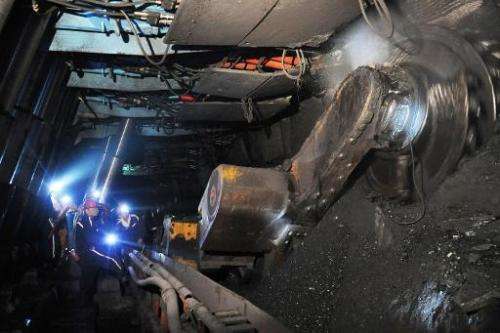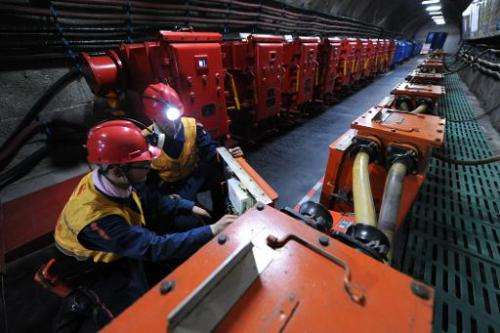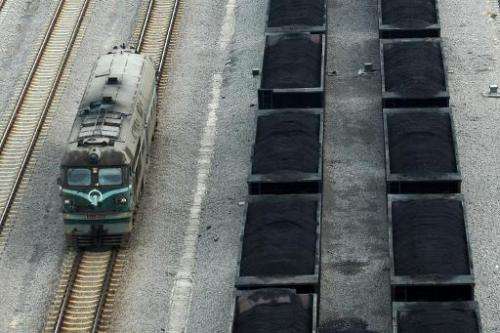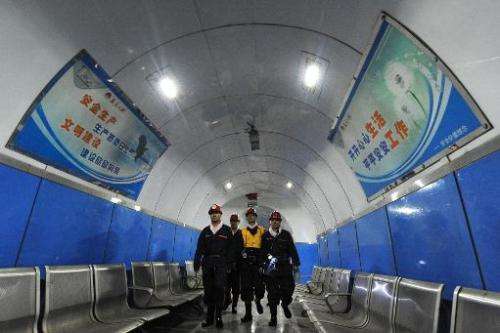Your money or your life: coal miner's dilemma mirrors China's

Forty years of digging for coal have left the miner with tuberculosis and drained his village water supply. But he, like China, clings to the resource as his economic mother lode.
"If I did farming, it would take me a year to get what I make in a month," said the 55-year-old, surnamed Di and sporting the blackened fingernails of someone who has spent most of his days beneath the hills of China's poverty-stricken Guizhou province.
His lungs "don't hurt much", he said, although in any case he cannot afford treatment.
China too has embraced the economic benefits of coal despite the threats it poses to health and the environment.
But anger has mounted over the stubborn smog that regularly cloaks Chinese cities, and authorities have repeatedly promised action since President Xi Jinping took office a year ago.
Premier Li Keqiang vowed to "declare war against pollution", speaking Wednesday at the opening of the Communist-controlled National People's Congress legislature's annual session.
The government will cap total energy consumption, shut 50,000 small coal-fired furnaces, clean up major coal-burning power plants and take six million high-emission vehicles off the roads, he promised.
Yet in practice, changing course will be tough in the face of swelling energy demand and pressure to sustain economic growth, already at its lowest levels since 1999.
"Since environmental issues have become so public—everybody is talking about them, the international community is talking about them—the government feels the need to deal with environmental issues more seriously," said Xiaomin Liu, a Beijing-based coal expert with the consultancy IHS CERA.
"They will do a lot of things, but I don't think that will change things fundamentally," he said. "The first priority is still to keep up economic growth."
Smog scandal
China uses more energy than any other country and is responsible for about half the world's coal consumption, relying on the fossil fuel for two-thirds of its energy supply.

Public pressure over pollution erupted in January 2013 when an "airpocalypse" of smog choked Beijing, with particulate matter shooting 40 times past UN standards and horrifying images spreading worldwide.
The scandal prompted authorities to stop burying the problem—cities and state-controlled media began reporting on air quality, and this year 15,000 factories were required to regularly publicise emissions data.
Over the past year Beijing has already allocated 1.7 trillion yuan ($280 billion) to improve air quality, and pledged to evaluate officials not only by their economic but also environmental record.
Last September it announced tough air pollution limits, called for coal-use cuts in three densely populated areas, including the capital, and promised to shave nationwide coal consumption to 65 percent of total energy by 2017.
Some of the targets were "ambitious", sending an important message, said Alvin Lin, the Beijing-based China climate and energy policy director at the Natural Resources Defense Council.
"Once you send that signal, then everybody has to try to meet it."
But implementation is another matter and even stricter quotas were still needed, he warned.
Terrible cost
Another concern is that wealthier coastal cities, which have complained about pollution the loudest, will simply shift their coal-fired power-stations and factories to the country's poorer interior.
"Maybe the push is going to be just to push the dirty coal further west," said Jennifer Turner, director of the China Environment Forum at the Wilson Center in Washington. "It's the whole NIMBY (not in my backyard) movement."

Guizhou, in southwestern China, has pledged to close half its mines—about 800—by mid-2014, but this follows a broader trend of shutting small struggling operators without necessarily cutting overall production.
Villagers around Anshun have long reaped the benefits of coal, earning as much as 6,000 yuan a month from mining, double what they could make as labourers and 10 times more than farming.
Nonetheless, some see the advantages of ending the fatal explosions, blackened lungs, water shortages and the threat of collapsing homes.
Opposite a mine in Anshun, along a picturesque valley lined with gentle terraces of yellow rapeseed amid a cascade of smoky blue hills, Zhang Yan tearfully recalled searching for her husband after he failed to return from work one evening last year.
He had been killed on the job, and their teenage son said his father had urged him to find another trade.

"He had talked with me about this, 'Don't do this work, stay above ground, it's safer'," he said, huddling around a stove for warmth.
Up the road, a longtime miner surnamed Yan said he quit last year for fear of the "hidden danger".
"Closing the mines is a good thing, first off because of the environmental damage to homes and water," said the 45-year-old father of two, who is debating whether to leave his family in Guizhou to find work elsewhere.
"The benefits are only temporary," he said. "In the long term there are no benefits."
© 2014 AFP



















